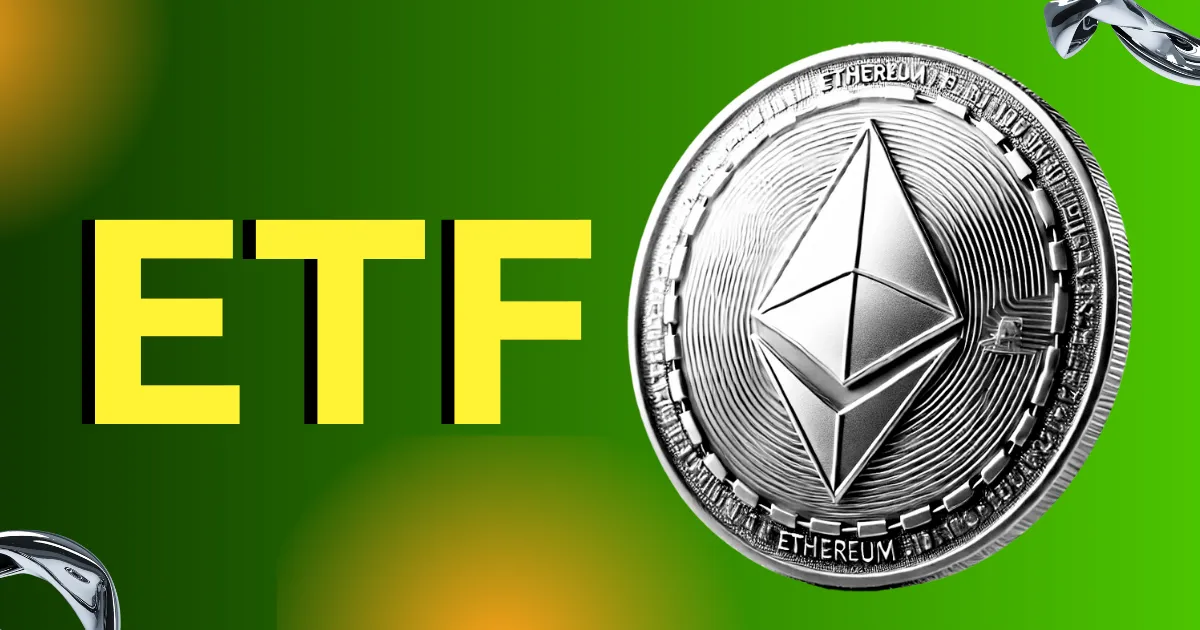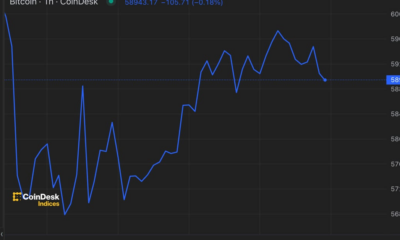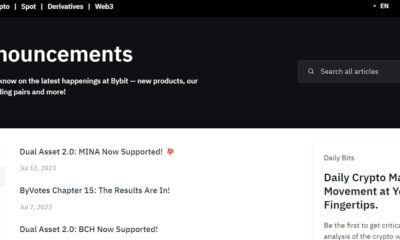Ethereum
Grayscale Investments® Provides Update on Upcoming Corporate Action for Shareholders of Grayscale Ethereum Trust (Ticker: ETHE)


Grayscale Investments
STAMFORD, Conn., July 17, 2024 (GLOBE NEWSWIRE) — Grayscale Investments®, the world’s largest crypto asset manager*, offering over 20 cryptocurrency investment products, previously announced that it has set July 18, 2024 (the “Record Date”) as the date for the initial creation and distribution of shares of Grayscale Ethereum Mini Trust (the “ETH Trust”) to shareholders of Grayscale Ethereum Trust (ticker: ETHE) (“ETHE”) (referred to as the “Initial Distribution”). Grayscale intends to list the ETH Trust on NYSE Arca, subject to required regulatory approvals, under the ticker symbol “ETH.” View this press release here.
Today, Grayscale confirms that as of July 18, 2024, any person purchasing ETHE shares will not be entitled to receive ETH shares in the initial distribution.
In addition, Grayscale currently anticipates that the distribution date will be July 23, 2024, following (i) the filing and effectiveness of the ETH Trust’s registration statement on Form 8-A to register the ETH Shares under the Exchange Act, (ii) the effectiveness of the ETH Trust’s registration statement on Form S-1 (Registration No. 333-278878) under the Securities Act, and (iii) approval of the listing of the ETH Shares on NYSE Arca. No assurance can be given that the initial distribution will occur on Grayscale’s anticipated schedule, and Grayscale will keep the market informed as its expectations change.
|
Registration Date |
July 18, 2024 |
|
|
Ratio of ETHE shares: ETH shares |
1:1 |
|
|
% of Ether held by ETHE contributed to the ETH Trust |
ten% |
|
|
Expected distribution date |
July 23, 2024 |
|
*By AUM as of 07/15/2024
NO OFFER OR SOLICITATION
This communication is for informational purposes only, in your capacity as a shareholder of ETHE, and does not constitute an offer to sell or the solicitation of an offer to buy any securities or a solicitation of any vote or approval, nor shall there be any sale of securities in any jurisdiction in which such offer, solicitation or sale would be unlawful prior to registration or qualification under the securities laws of any such jurisdiction. No shareholder approval of the initial distribution is required by applicable law, and we are not seeking approval of ETHE shareholders.
FORWARD-LOOKING STATEMENTS
Some of the statements contained herein may be statements of future expectations and other forward-looking statements that are based on Grayscale’s beliefs and assumptions and involve known and unknown risks and uncertainties that could cause actual events to differ materially from those expressed or implied in such statements. Grayscale undertakes no obligation to update any forward-looking statements contained herein and you should not place undue reliance on these statements, which speak only as of the date hereof. Although Grayscale has taken reasonable precautions to ensure that the information contained herein is accurate, no representation or warranty (including liability to third parties), express or implied, is made by Grayscale as to its accuracy, reliability or completeness. You should not make any investment decision based on these forward-looking statements. No assurance can be given that the initial distribution will occur on the schedule anticipated by Grayscale, or at all.
The story continues
IMPORTANCE OF OBTAINING PROFESSIONAL TAX ADVICE
This communication is not intended to be, and does not constitute, tax advice. As more fully set forth in the section of the preliminary information statement filed by ETHE entitled “Material U.S. Federal Income Tax Consequences of the Initial Distribution,” the U.S. federal income tax consequences of the Initial Distribution are complex, subject to certain uncertainties, and may be affected by circumstances unique to a beneficial owner of ETHE Shares. Any beneficial owner of ETHE Shares who receives ETH Shares in the Initial Distribution, and any intermediary holding ETHE Shares or ETH Shares, should consult its own tax advisor regarding the U.S. federal income tax consequences of the Initial Distribution, including the appropriate allocation of the existing tax basis between the ETHE Shares and the ETH Shares. Please refer to the preliminary information statement filed by ETHE for more information, including other U.S. federal income tax considerations relating to the Initial Distribution and ownership of ETH Shares.
ADDITIONAL INFORMATION AND WHERE TO FIND IT
A definitive information statement on Schedule 14C will be provided to ETHE shareholders on or after the record date to inform ETHE shareholders of the initial distribution, in substantial compliance with Regulation 14C under the Exchange Act. The information statement will describe the Grayscale Ethereum Mini Trust, the risks associated with holding shares of the Grayscale Ethereum Mini Trust and other details regarding the initial distribution, and will be made available on our website at www.grayscale.com/documents#regulatoryfilingsETHE shareholders will not need to pay any consideration, exchange or dispose of existing ETHE shares, or take any other action to receive shares of the Grayscale Ethereum Mini Trust as part of the initial distribution.
ETHE is not a fund registered under the Investment Company Act of 1940 and is not subject to regulation under the Investment Company Act of 1940, unlike most mutual funds or ETFs.
Grayscale Ethereum Trust and Grayscale Ethereum Mini Trust Risk Disclosure:
An investment in the Grayscale Ethereum Trust or the Grayscale Ethereum Mini Trust may be considered speculative and is not intended to be a complete investment program. An investment in ETHE or the Grayscale Ethereum Mini Trust should be considered by individuals who are financially capable of maintaining their investment and who can bear the risk of total loss associated with an investment in ETHE or the Grayscale Ethereum Mini Trust. The extreme volatility in trading prices that many digital assets, including Ether, have experienced in recent periods and may continue to experience, could have a material adverse effect on the value of ETHE and the Grayscale Ethereum Mini Trust and the shares of each trust could lose all or substantially all of their value. Digital assets represent a new and rapidly evolving industry. The value of ETHE and the Grayscale Ethereum Mini Trust depends on the acceptance of digital assets, the capabilities and development of blockchain technologies, and the fundamental investment characteristics of the digital asset. Digital asset networks are developed by a diverse set of contributors and the perception that certain high-profile contributors will no longer contribute to the network could have a negative effect on the market price of the relevant digital asset. Digital assets may be held by concentrated ownership and significant sales or distributions by holders of such digital assets could have a negative effect on the market price of such digital assets. The value of ETHE and the Grayscale Ethereum Mini Trust is directly linked to the value of the underlying digital asset, the value of which may be highly volatile and subject to fluctuations due to a number of factors.
A registration statement relating to Grayscale Ethereum Mini Trust has been filed with the SEC but has not yet become effective. No investment in the Grayscale Ethereum Mini Trust may be made, nor money accepted, until the registration statement is effective. An investor should carefully consider the investment objectives, risks, and charges and expenses of the Grayscale Ethereum Mini Trust before investing. A preliminary prospectus containing information about Grayscale Ethereum Mini Trust may be obtained by sending an email to info@grayscale.comThe information contained in the preliminary prospectus is not complete and is subject to change. The final prospectus should be read carefully before investing and, when available, may be obtained from the same source. This communication does not constitute an offer to sell shares or a solicitation of an offer to buy shares in any state in which the offer or sale is not authorized.
Grayscale Investments, LLC is the sponsor of the Grayscale Ethereum Trust and the Grayscale Ethereum Mini Trust.
About Grayscale Investments®
Grayscale connects investors to the digital economy through a suite of regulated, forward-thinking investment products. Founded in 2013, Grayscale has a proven track record and deep expertise as the world’s largest crypto asset manager. Investors, advisors and allocators turn to Grayscale for single-asset, diversified and thematic exposure. Certain Grayscale products are distributed by Grayscale Securities, LLC (member FINRA/SIPC) and certain products are managed by Grayscale Advisors, LLC.
Media Contact
Jennifer Rosenthal
press@grayscale.com
Ethereum
Crypto Token Ether (ETH) Rebounds Following Complaint About SEC Investigation Into Ethereum

The Ether token posted its best gain this week amid speculation that U.S. regulatory oversight of the blockchain ecosystem underlying the second-largest digital asset could ease.
The token climbed as much as 3.6% on Wednesday before paring some of its advance to trade at $3,562 as of 12:53 p.m. in Singapore. The rally was a modest tailwind for market leader Bitcoin and a string of smaller rivals.
Ethereum
Will they capture the same buzz in the market?

The launch of Ethereum spot exchange traded funds Exchange traded funds (ETFs) attracted significant market interest on July 23, with initial inflows surpassing $100 million. This is a notable change from the previous four days of outflows for U.S. spot Ether ETFs, which saw a total of $33.67 million in new investments.
This figure was, however, partly offset by an outflow of $120.28 million from Grayscale’s Ethereum Trust (ETHE). However, many crypto analysts believe that the Ethereum ETF will soon follow bitcoin’s path.
Ethereum ETF to Track Bitcoin
Katalin Tischhauser, head of investment research at Sygnum Bank and a former Goldman Sachs executive, predicted that Spot Ether exchange-traded funds could attract as much as $10 billion in assets under management in their first year.
She also predicted that Bitcoin ETFs could see inflows of $30 billion to $50 billion in their first 12 months, with Ethereum products likely following the same path.
Tischhauser noted that investing in Ethereum offers distinct advantages over Bitcoin. While Bitcoin is primarily viewed as a store of value, Ethereum’s value comes from revenue and cash flow. This makes Ether more relevant to traditional institutional investors compared to the perception of Bitcoin as “digital gold.”
Fee waivers to attract institutional investors
To attract institutional investors, several ETF issuers are waiving fees for their Ethereum spot funds. Franklin Templeton announced a 0.19% sponsorship fee, but will waive it for the first $10 billion in assets for six months. Meanwhile, Bitwise and VanEck will charge a 0.20% fee through 2025.
BlackRock revised its registration statement for its spot Ethereum ETF, ETHA, to include a 0.25% management fee. Grayscale launched its Grayscale Ethereum Mini Trust with the same 0.25% fee.
Ethereum ETFs Exclude Staking
The enthusiasm is, however, tempered by the lack of staking rewards of these ETFs. In May, BlackRock, Grayscale and Bitwise removed staking provisions from their SEC filings after discussions with the SEC.
As traditional investment institutions are limited by regulations and legal constraints, they can only invest through ETFs, without resorting to staking.
Also see: Crypto News Today: Bitcoin, Ethereum Brace for Volatility as Fed Holds Rates
Ethereum
SEC Hints It May Approve Ethereum ETFs at Last Minute, But ‘No Issuers Are Ready’

It sounded like an almost certain rejection from the Securities and Exchange Commissionbut just hours before the May 23 deadline to rule on VanEck’s application to launch an Ethereum spot exchange traded fundIt appears that the SEC may reconsider its decision.
CoinDesk First reported On Monday, the nine potential issuers that had filed to list and trade the ETFs were “abruptly” asked by regulators to update their 19b-4 filings on an expedited basis. A 19b-4 is what an exchange like the NYSE requires for new product introductions — in other words, the applicants and the exchange ask the SEC for permission to add the ETFs to their platforms.
Since rumors began circulating Monday afternoon, the price of Ether has climbed nearly 20%, trading near $3,750 as of 1:30 p.m. ET Tuesday.
It’s hard to believe that the SEC would do us a favor by approving the ETH spot ETF.
But politics is politics, and crypto has been winning the political battle for months.
Perhaps the Biden camp saw how many voters Trump could win over with a single pro-crypto comment and decided to change course.
— Jake Chervinsky (@jchervinsky) May 21, 2024
Since VanEck is the first exchange to file, its approval could hypothetically be a green light for others waiting to hear about their own 19b-4s. While rumors began circulating Monday that applications were being worked on, Bloomberg analysts updated their ratings from 25% to 75% approval.
But the news left issuers scratching their heads. Every issuer Bloomberg ETF analyst James Seyffart spoke to was “caught off guard by the SEC’s 180-degree turn,” he told Fortune. The agency reached out to filers for comment and updates just three days before the deadline, he said.
“This is not standard operating procedure, and everyone from issuers to exchanges to lawyers to market makers and more are scrambling to be ready for eventual approval and to meet SEC requirements,” Seyffart adds. The hasty nature of the pivot suggests it was likely a “political move,” the result of a “top-down decision” by the Biden administration, he speculates. “No issuer is ready,” he wrote on X.
It’s hard to believe that the SEC would do us a favor by approving the ETH spot ETF.
But politics is politics, and crypto has been winning the political battle for months.
Perhaps the Biden camp saw how many voters Trump could win over with a single pro-crypto comment and decided to change course.
— Jake Chervinsky (@jchervinsky) May 21, 2024
So far, Grayscale is the only potential issuer to post an update 19b-4 to the New York Stock Exchange website, for its application to transfer its Ethereum Mini Trust ETF. Meanwhile, Fidelity has abandoned its plan to put Ether in its ETF, according to a S-1 Update The filing was made with the SEC early Tuesday. In previous filings, the company had said it intended to “stake a portion of the trust assets” to “one or more” infrastructure providers, but now it “will not stake Ether” stored with the custodian.
Staking involves committing Ether to secure the network in exchange for a yield, which is currently around 3%, according to data from staking service Lido. Ark and Franklin Templeton have also considered staking in their applications. In today’s 19b-4 update from Grayscale, the company confirmed that it would not participate in staking. The fact that Grayscale highlighted this and Fidelity omitted it suggests that the SEC may have asked that staking be banned. Vance Spencer, co-founder of Business executivestold Fortune he believed the SEC’s last-minute requests included advice on staking.
Staking the underlying Ether in the ETF has been seen as a reason the SEC could reject the applications, with Chairman Gary Gensler expressing concern in March that digital assets using staking protocols could be considered securities under federal law. Staking could be “a significant complication,” Bitwise CIO Matt Hougan said. previously said Fortune.
However, even if the SEC approves VanEck’s 19b-4 on Thursday, it doesn’t guarantee clearance, as exchanges will need S-1 filings from issuers before the products can begin trading. When filing to launch a new security, an S-1 is the form that describes to potential investors and the SEC the structure of the asset, how it will be managed and, in this case, how it plans to mirror the performance of the underlying asset, namely Ether tokens.
But S-1 projects could take “weeks, if not months” to be approved, Seyffart said. written on X“That said, if we are correct and see these theoretical approvals later this week, that should mean that S-1 approvals are a matter of ‘when’ and not ‘if.’”
Recommended newsletter:
CEO Daily provides essential context for the information business leaders need to know. Every weekday morning, more than 125,000 readers trust CEO Daily for insights into leaders and their businesses. Subscribe now.
Fuente
Ethereum
FOMC Holds Interest Rates Steady, Bitcoin and Ethereum Prices Fall

After Federal Reserve Chairman Jerome Powell said a September rate cut “could be on the cards,” stocks soared to session highs. The tech-heavy Nasdaq 100 climbed 3.3% and the S&P 500 climbed 2%. However, the king cryptocurrency Bitcoin (BTC) fell 1.3% to $66,088, and Ethereum (ETH) fell about 1.11% to $3,313. Over the past 24 hours, the global cryptocurrency market cap also fell 0.71% to $2.39 trillion.
However, market analysts believe that this is a short-term decline, as Bitcoin and other cryptocurrencies, despite being in a bearish situation, are showing bullish signals. Although BTC is still struggling to break the $70,000 mark, it will be interesting to see how BTC will react in August before the rate cuts.
Federal Reserve Decision
On July 31, the U.S. Federal Reserve concluded a two-day meeting of the Federal Open Market Committee (FOMC) by choosing to keep benchmark interest rates unchanged at 5.25%-5.50%, in line with Wall Street expectations. The decision marked the eighth consecutive meeting without a rate change.
Towards a market rebound?
According to SantimentThe FOMC’s decision to maintain current interest rates led to an initial decline in cryptocurrency prices. Traders were hoping for a rate cut, which hasn’t happened since March 2020. A future rate cut could signal bullish trends for stocks and cryptocurrencies, potentially boosting markets for the remainder of 2024. Despite the initial sell-off, markets are likely to stabilize unless another major event impacts the cryptocurrency sector.
In the meantime, aggressive accumulation by bulls and increasing negative sentiment among the crowd could set the stage for a substantial market rebound.
Understanding the broader impact
Despite the anticipation surrounding the FOMC meeting, the impact on cryptocurrencies was limited as the pause on rates had already been factored into prices. Previous Fed decisions have shown minimal major impact on Bitcoin prices.
Historically, FOMC actions affect all asset classes. In 2020 and 2021, Bitcoin and other altcoins soared when the Fed cut rates to zero, only to reverse course in 2022 when rates began to rise. Investors moved trillions of dollars into lower-risk assets, with money market funds amassing over $6.1 trillion, earning an average return of 5%.
Furthermore, Bitcoin’s immediate resistance is noted at $66,852, with support at $65,000. The RSI is signaling oversold conditions, suggesting further declines are possible if the price falls below $65,900.
Investors are now closely watching the FOMC meeting for clues about inflation and economic growth, which could influence Bitcoin’s next move.
-

 News1 year ago
News1 year agoBitcoin (BTC) price recovery faces test on non-farm payrolls
-

 Bitcoin12 months ago
Bitcoin12 months ago1 Top Cryptocurrency That Could Surge Over 4,300%, According to This Wall Street Firm
-

 Altcoins12 months ago
Altcoins12 months agoOn-chain data confirms whales are preparing for altcoin surge with increased buy orders
-

 Bitcoin12 months ago
Bitcoin12 months agoThe US government may start accumulating Bitcoin, but how and why?
-

 News1 year ago
News1 year agoNew ByBit Listings for 2024: 10 Potential Listings
-

 News1 year ago
News1 year ago11 Best Crypto TikTok Accounts & Influencers in 2024
-

 Altcoins1 year ago
Altcoins1 year agoMarket giants have taken action!
-

 News1 year ago
News1 year ago11 Best Shitcoins to Buy in 2024: The Full List
-

 Ethereum1 year ago
Ethereum1 year agoTop Meme Coins by Market Capitalization in 2024
-

 News1 year ago
News1 year ago1.08 Trillion SHIBs Dumped on Major Crypto Exchange, What’s Going On?
-

 News1 year ago
News1 year ago19 Best Crypto Games to Play in 2024
-

 Altcoins1 year ago
Altcoins1 year agoAltcoin Recommended by Crypto Expert for Today’s Portfolio















